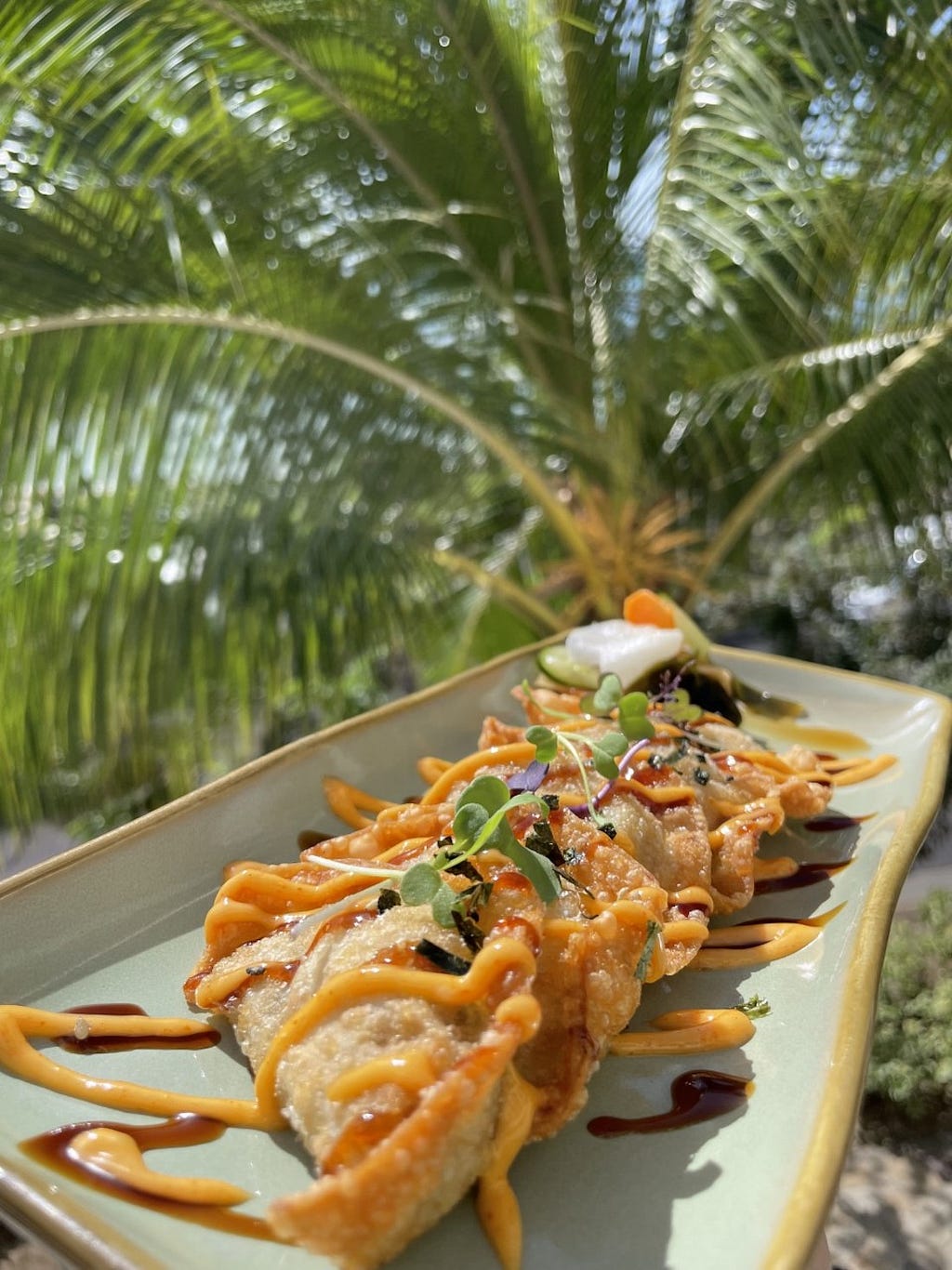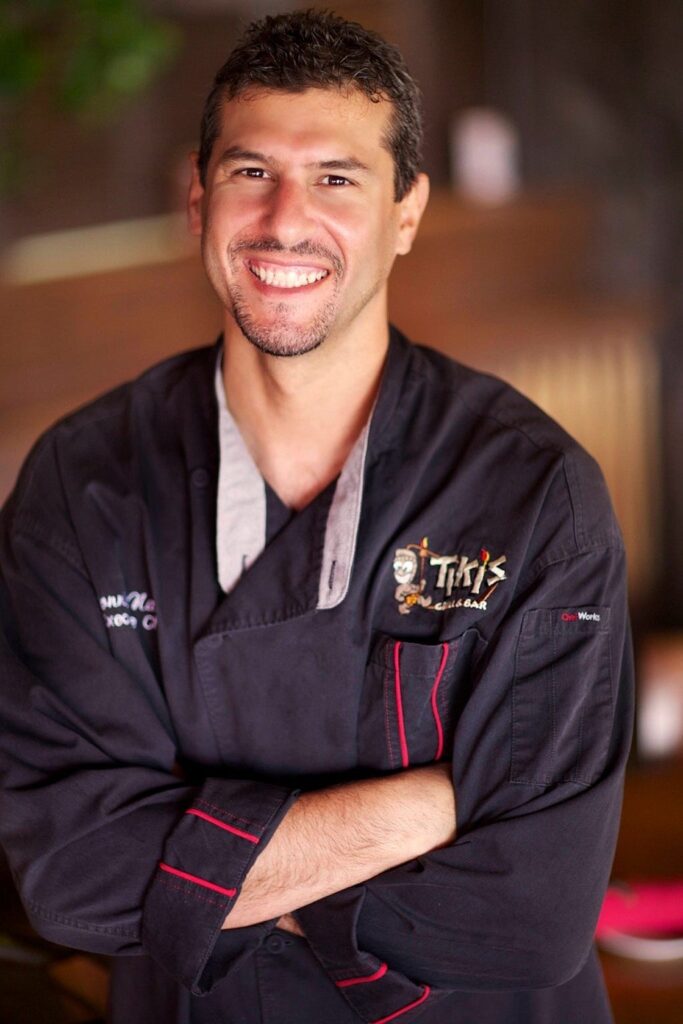Executive Chef Ronnie Nasuti Of Tiki’s Bar & Grill: 5 Things I Wish Someone Told Me Before I Became a Chef
An Interview With Martita Mestey
Balance is Crucial. The kitchen can be chaotic, and it’s easy to lose oneself in the whirlwind. Remember to balance work with rest and personal growth.
As a part of our series about the lessons from influential ‘TasteMakers’, I had the distinct pleasure of interviewing Ronnie Nasuti.
Chef Ronnie Nasuti’s storied career in the culinary industry began when he was just 13 years old. He has served as the Executive Chef at Tiki’s Grill & Bar in Waikiki since 2011, and enjoys employing his talents at this fun and exciting high-volume restaurant. He has been an active supporter of many of Hawaii’s charities including The Hawaii Foodbank, HUGS, Aloha United Way, and Big Brothers Big Sisters Honolulu, among many others.
Thank you so much for doing this with us! Our readers would love to ‘get to know’ you a bit. Can you share with our readers a story about what inspired you to become a restauranteur or chef?
I knew from a young age that I would be a chef — I took Culinary Arts in high school for four years. Even knowing then that it would be a life of working nights, weekends and holidays didn’t deter me. As I grow older, it still doesn’t bother me!
Do you have a specific type of food that you focus on? What was it that first drew you to cooking that type of food? Can you share a story about that with us?
At Tiki’s, we focus on American and Pacific Rim cuisine.
Can you share the funniest or most interesting story that has happened to you since you became a chef? What was the lesson or take away you took out of that story?
I mentored under Chef Roy Yamaguchi as well as his previous Chefs, Jackie Lau & Gordon Hopkins. As the Executive Chef for the original Roy’s restaurant for ten years, I worked with & did themed wine dinners and charity events with a large array of chefs from all over America & Japan. It was an experience I wouldn’t trade for anything.
I learned that you need to get into the most cutting-edge kitchen you can and spend a couple of years learning and cooking. There will be failed dish after failed dish, but that’s okay, it’s a repetition thing. After that, move on to the next kitchen of your choice and do a few of these. Different cuisines and styles are always a plus, you never want to stick with just one.
Can you tell us a story about the hard times that you faced when you first started your journey? How did you overcome this obstacle?
I feel as though we are (chefs) kind of a dying breed of people because of the personal sacrifice it requires of us. But it’s a fun, creative outlet, and the high energy it takes going into battle serving scratch-made food for hundreds of people in a few hours every night is the reward and sense of accomplishment.
COVID was a major obstacle that put so many out of business in our industry and others. But I feel as though it was exponential for the restaurant business. We opened and closed three times! We are fortunate to be as busy as we are but the casualties are many. We all watched dozens of restaurants close permanently in Hawaii. The other thing is because of that, there was an exodus and that left the labor pool heavily depleted. Tikis is fortunate to be successful and we owe it to our great ohana. Our loyal staff & loyal patrons have gotten us through the toughest period in the hospitality business since 9/11.
In your experience, what is the key to creating a dish that customers are crazy about?
The key to creating a dish that resonates with customers lies in understanding their preferences while also challenging them a bit. Our clientele is broad-spectrum travelers from around the world. It’s about presenting them with familiar elements in a new and exciting way. And of course, quality ingredients are paramount. When the components are high quality and locally sourced, and the flavors are well-balanced, the dish speaks for itself.
Personally, what is the ‘perfect meal for you’?
The perfect meal for me is one that brings people together. It could be a simple, freshly-caught fish grilled to perfection or a complex, multi-course feast. The variety of foods that people eat in Hawaii are unique in that our population here is so multiethnic and predominantly Asian. The mixture of ingredients and techniques that are incorporated into “American” cuisine makes the flavor combinations extraordinary. The food is important, but what makes a meal truly perfect is sharing it with good company in a relaxing and beautiful setting, like here in our island home. Island potlucks and luaus have a huge variety of different foods to choose from. This is also how I approach my menu at Tiki’s.
Where does your inspiration for creating come from? Is there something that you turn to for a daily creativity boost?
My inspiration often comes from the art of problem-solving. Whether it’s tweaking a recipe or fixing a piece of kitchen equipment, I find the process of figuring out how things work and making them better exhilarating. The kitchen is my canvas, and the ingredients are my palette. For daily creativity, I often turn to the rich and diverse culinary traditions of the world, seeking to learn and incorporate different flavors, techniques, and cultures into my own cuisine.
Are you working on any new or exciting projects now? What impact do you think this will have?
Currently, I am excited about our initiative to incorporate more locally sourced ingredients into our menu at Tiki’s. By doing so, we aim to support local farmers, fishermen, and the local economy as a whole. This initiative also allows us to provide our customers with the freshest, most flavorful dishes while reducing our environmental footprint.
What advice would you give to other chefs or restaurateurs to thrive and avoid burnout?
Find something that you’re passionate about. For me, teaching cooking classes for middle school, high school, and after-school programs has been one of my favorite past times. Whenever I feel tired or drained, the smiles on the kid’s faces who are thrilled to see what they’ve created put the fuel right back in me. It could warm even the coldest heart.

Thank you for all that. Now we are ready for the main question of the interview. What are your “5 Things I Wish Someone Told Me When I First Started as a Chef” and why?
I knew I wanted to be a chef in 8th grade; I majored in culinary in 9th grade in vocational school and have worked in a commercial kitchen for 40 years.
- Look outward more. It’s hard when you’re a young and aspiring chef. The industry can be consuming because of how high energy and fun it is.
- Balance is Crucial. The kitchen can be chaotic, and it’s easy to lose oneself in the whirlwind. Remember to balance work with rest and personal growth.
- Find the BEST possible restaurant wherever you are and get a job there. Work in the best restaurants for 2 years and then leave no matter how much you like it to expand your education.
- Fall in love with someone in the same industry because the hours you work as a chef requires your partner to understand that you won’t be around on holidays and weekends for a large portion of your career.
What’s the one dish people have to try if they visit your establishment?
Our Kalbi Molokai Venison Gyoza is a unique dish of crunchy venison dumplings, beef, and bok choy with miso chili aioli & sunomono. The venison is sourced from axis deer, and the beauty of the protein that axis deer provides is astounding. It has been featured on Iron Chef America a few times, and chefs all around the world now prefer axis deer over any other wild game protein because of its high quality and exoticness.
Conservation is very important to me, so we harvest wild deer to try and bring down the population to a manageable state. We also make sure the doe-to-buck numbers are where they should be.
You are a person of enormous influence. If you could inspire a movement that would bring the most amount of good to the most amount of people, what would that be? You never know what your idea can trigger.
If I could inspire a movement, it would undoubtedly be about fostering self-sufficiency and creativity. From an early age, I learned to fix things, starting with bikes and motorcycles, and later on, kitchen equipment. This ability to understand how things work, and adapting and finding solutions on the fly, is a skill I believe everyone could benefit from. It’s the root of common sense. With this mindset, we could inspire a new generation to be more resourceful, innovative, and less dependent on disposable goods. It’s a movement that could simultaneously drive creativity, reduce waste, and promote sustainability. I personally don’t throw away anything I can fix.
I liken this to me teaching my son to cook (at least, many of the basics). I explained to him that as he goes to college and beyond, this ability would serve him well as he wouldn’t have to eat packaged ramen all the time like other kids! In fact, it’s in part how he landed his wife, as she loves to eat and he’s a fantastic cook! It’s like the old adage: teach someone to fish & they will never go hungry.
Thank you so much for these insights. This was very inspirational!
Executive Chef Ronnie Nasuti Of Tiki’s Bar & Grill: 5 Things I Wish Someone Told Me Before I Became… was originally published in Authority Magazine on Medium, where people are continuing the conversation by highlighting and responding to this story.
